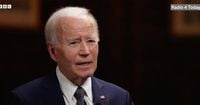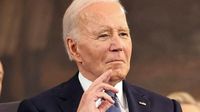Former President Joe Biden has accused the Trump administration of engaging in "modern-day appeasement" regarding its dealings with Russia, particularly in relation to Ukraine. In an exclusive interview with the BBC, Biden expressed concern over the pressure exerted by Trump on Ukraine to concede territory to Russia, emphasizing that such concessions would not satisfy Russian President Vladimir Putin.
In the interview, which aired on May 7, 2025, Biden stated, "anybody that thinks he's going to stop" after giving up territory is "just foolish." He elaborated that Putin views Ukraine as part of Russia and warned that allowing a dictator to seize land would not lead to peace.
Speaking from his hometown of Wilmington, Delaware, Biden's comments echoed historical critiques of British Prime Minister Neville Chamberlain's policies before World War II. Chamberlain's attempts to appease Adolf Hitler by conceding territory are often cited as a failure that led to greater conflict. "It is modern-day appeasement," Biden said, drawing parallels to the current geopolitical climate.
The interview coincided with the 80th anniversary of VE Day, a significant moment in history marking the Allied victory in Europe. Biden noted that NATO has played a crucial role in maintaining peace since then and expressed concern that Trump’s isolationist policies could undermine this alliance. "If NATO were to die out, it would change the modern history of the world," he stated, highlighting the potential ramifications of losing transatlantic unity.
Trump has consistently advocated for a more isolationist approach, often criticizing NATO and suggesting a reevaluation of U.S. commitments to its allies. Biden remarked that the current administration's stance has left European leaders questioning their reliance on the United States. "Look at the number of European leaders wondering, 'What do I do now? What's the best route for me to take? Can I rely on the United States?'" he said.
In the interview, Biden also defended his record on U.S. aid to Ukraine, asserting that his administration provided Kyiv with the necessary support to maintain its independence. He countered claims from Trump and others who argue that he did not do enough to assist Ukraine against Russia's aggression, which began with the full-scale invasion in February 2022.
During the discussion, Biden was reminded of his own political challenges, including the end of his 2024 re-election campaign after a lackluster debate performance against Trump. He acknowledged the difficulty of stepping aside from the race, stating, "I think it was the right decision. I think that… it was just a difficult decision."
Trump has recently suggested that both Ukraine and Russia should negotiate a cease-fire and that Ukraine should accept the loss of territory, including Crimea, which Russia annexed in 2014. Biden criticized this stance, arguing that it undermines the principles of freedom and democracy. "What the hell's going on here? What president ever talks like that?" he asked rhetorically, condemning Trump's proposals to reclaim the Panama Canal and acquire Greenland.
White House communications director Steven Cheung responded to Biden's interview by questioning his mental fitness and calling him a "complete disgrace to this country." Cheung's remarks reflect the ongoing tensions between the two former presidents and their contrasting visions for U.S. foreign policy.
Biden’s interview also touched on the broader implications of Trump's policies, which he argued could embolden authoritarian regimes. "Without the buffer of NATO, Putin would not have stopped at Ukraine," he warned, suggesting that the stakes are higher than ever in the current geopolitical landscape.
As the Biden administration grapples with these challenges, the former president remains vocal about his concerns regarding the future of democracy and international alliances. He urged a return to a more collaborative approach to foreign policy, emphasizing the importance of solidarity among democratic nations.
In closing, Biden expressed a desire for history to be the judge of Trump's presidency, stating, "I don't see anything that was triumphant." His comments reflect a deep-seated belief in the necessity of a united front against threats to democracy, both at home and abroad.





